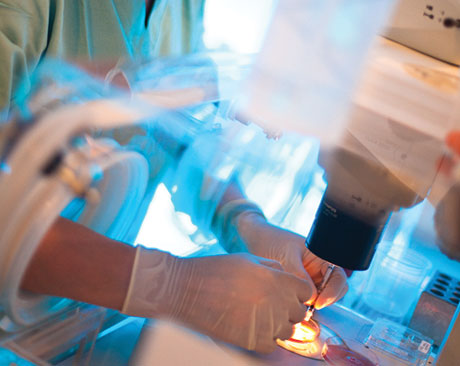
In Vitro Fertilization (IVF)
IVF, or In-Vitro Fertilization, is a procedure offered to suitable candidates wherein mature eggs are collected from a woman's ovary after the ovaries have been artificially stimulated. The eggs are then placed with the sperm in the laboratory. Fertilization happens without further intervention. The embryos that develop after 2 to 5 days are collected and one or two are transferred to the woman's uterus. One or more embryos, after successful treatment, will then implant in the lining of the uterus and a fetus will develop from each embryo. The woman will then proceed with the pregnancy as though she had conceived through natural means.
Which patients most probably need IVF to achieve a pregnacy?
Patients with the following conditions absolutely need IVF:
- Blocked Fallopian tubes or compromised function of the fallopian tubes due to severe adhesions from endometriosis or pelvic infections.
- Severe male factor infertility, severe oligo-astheno-teratozoospermia.
- Unexplained infertility and have undergone more than 3 to 6 failed intra-uterine insemination procedures.
Patients with the following conditions relatively need IVF:
- Long Duration of Infertility
- Advanced maternal age (more than 35 years old)
- Severe endometriosis
- Couples that are very infrequently together (e.g. overseas workers)
- Polycystic ovaries that respond only to high doses of gonadotropins
- Polycystic ovaries that have an excessive multifollicular response to ovarian stimulation
- Cancer patients desiring fertility preservation